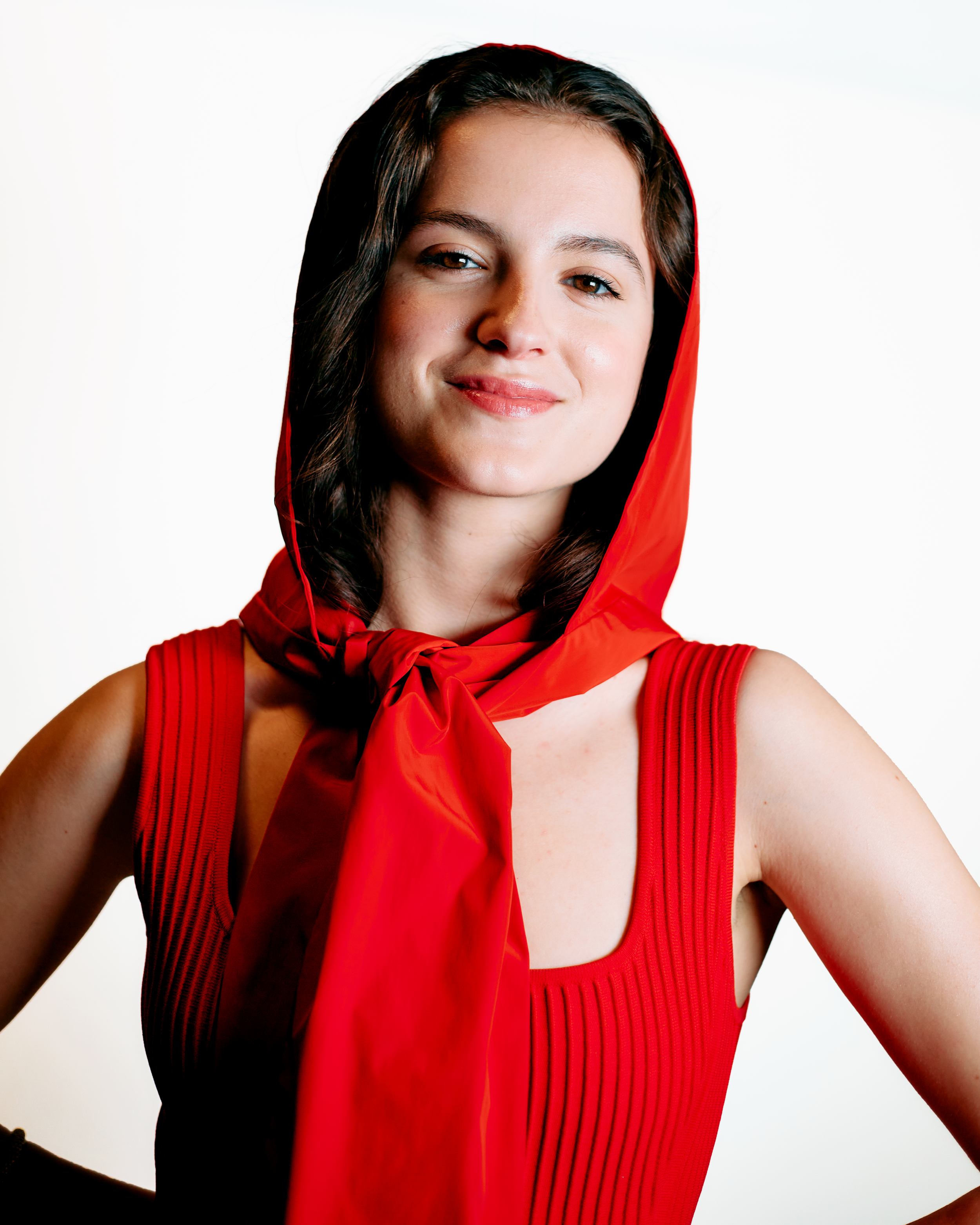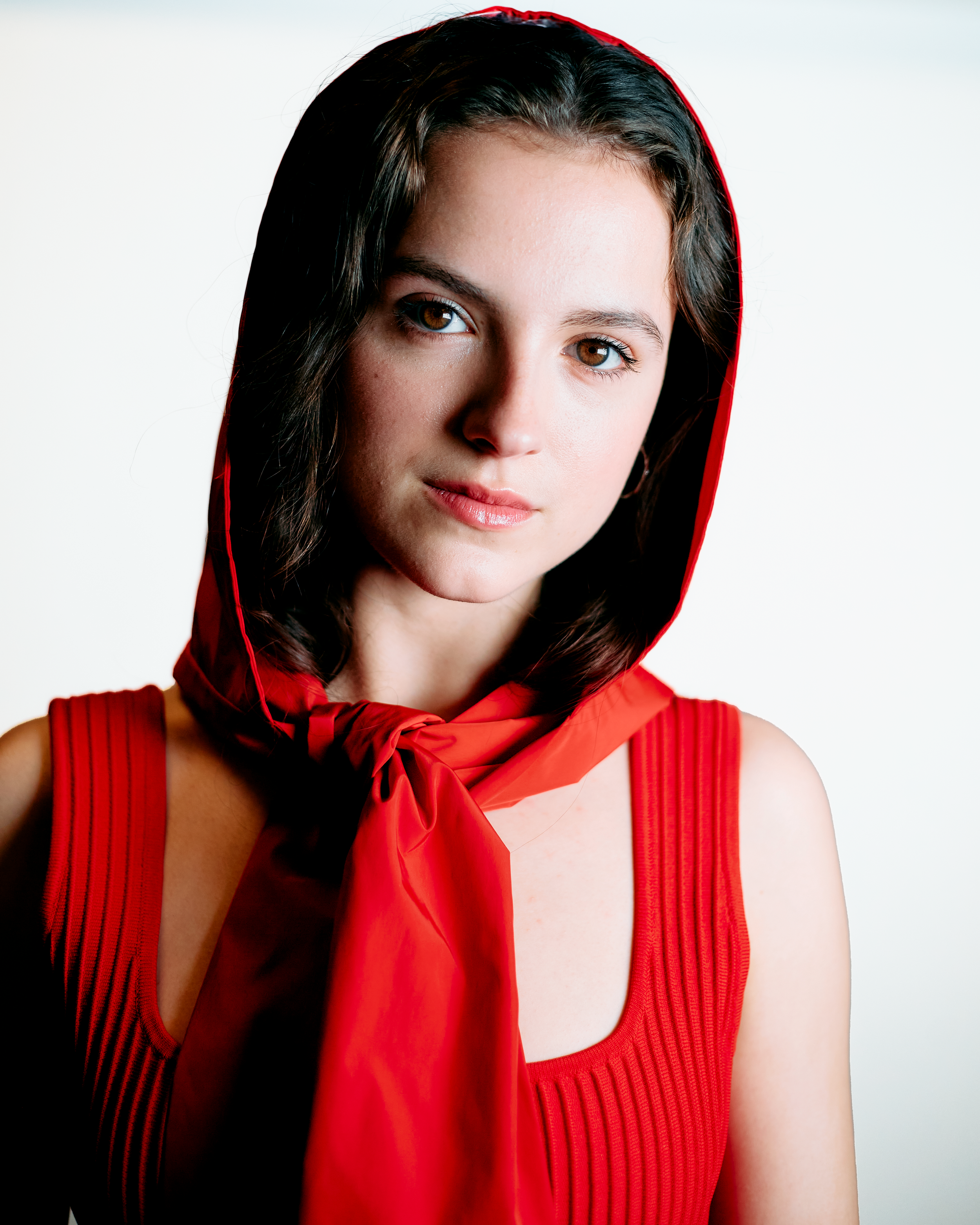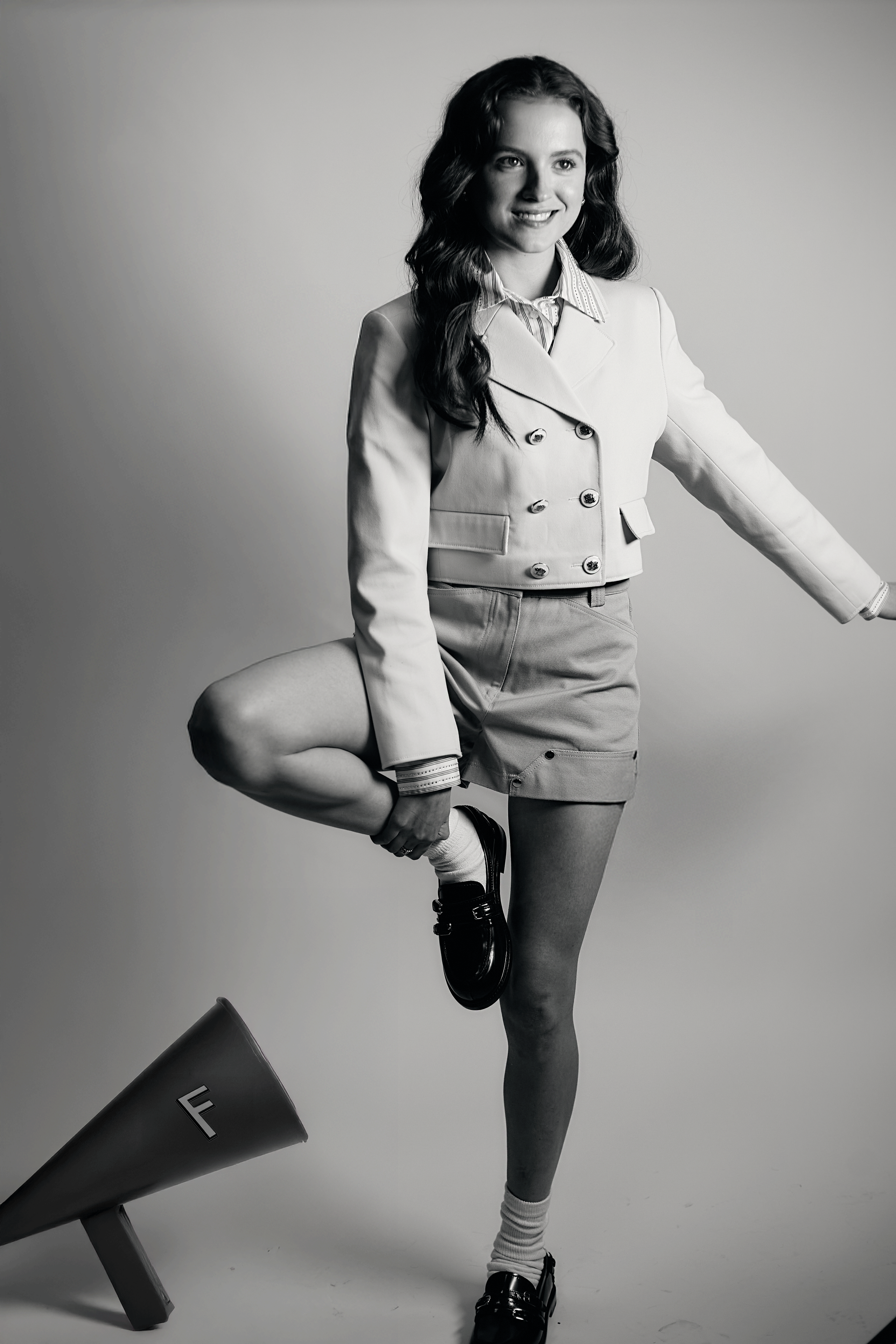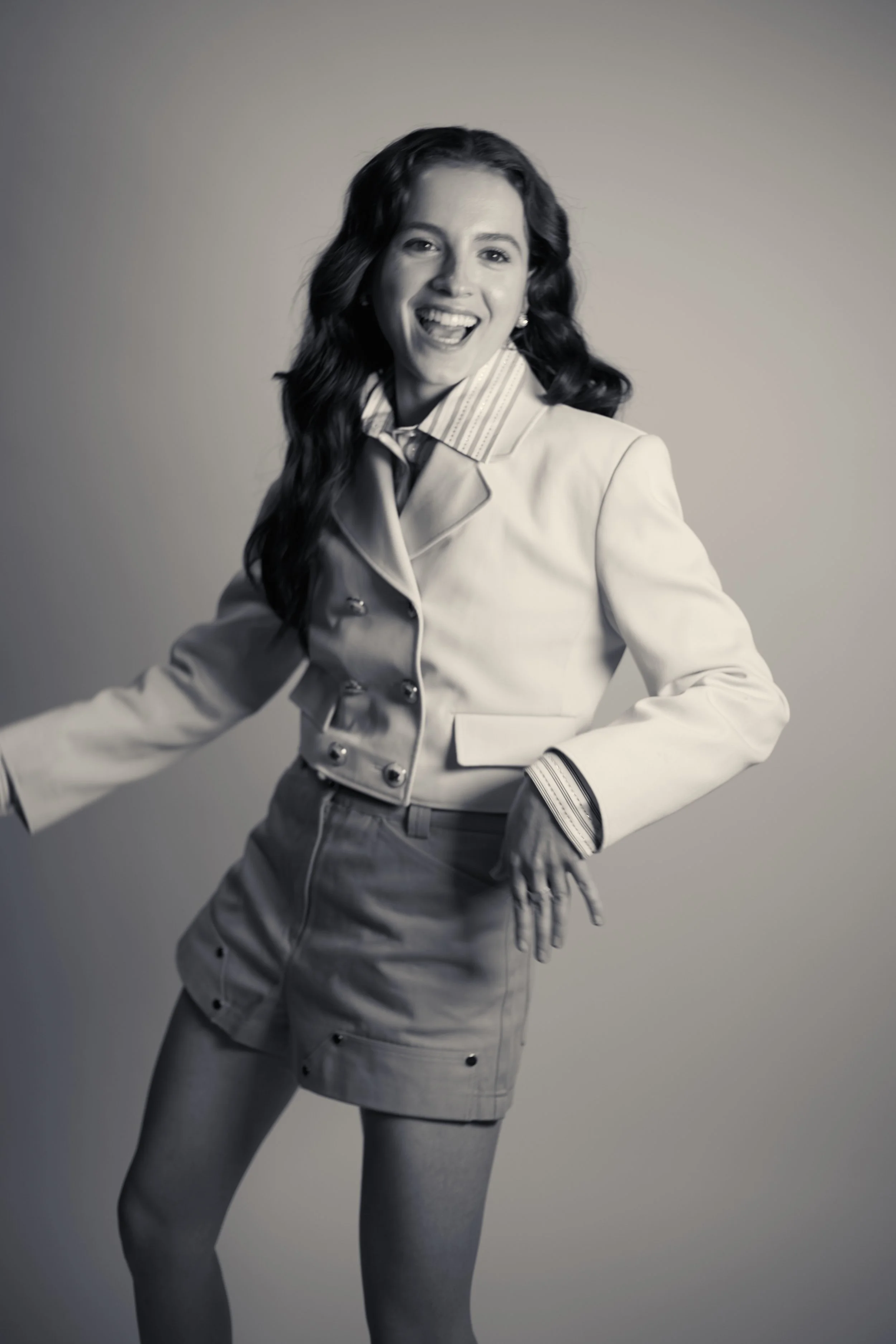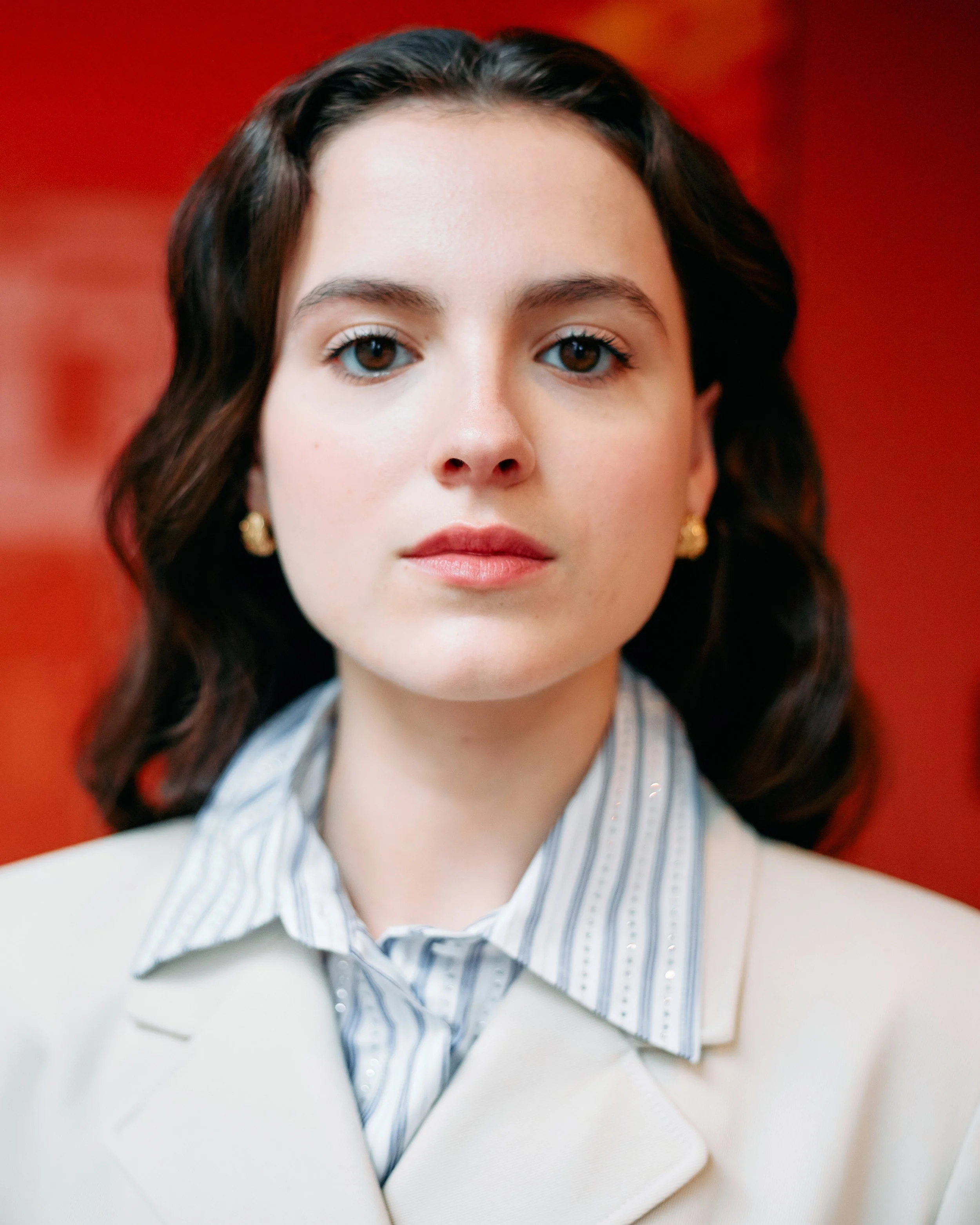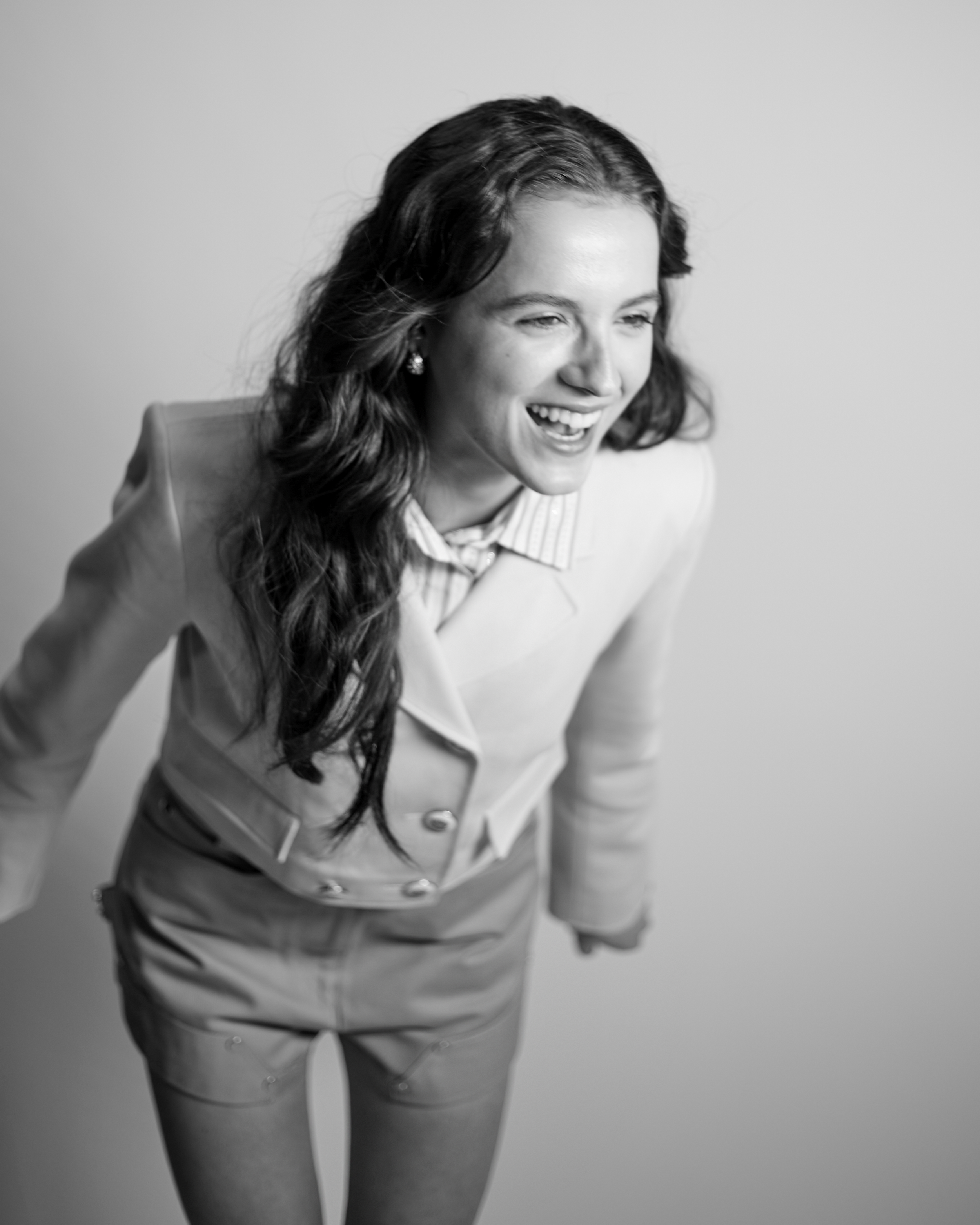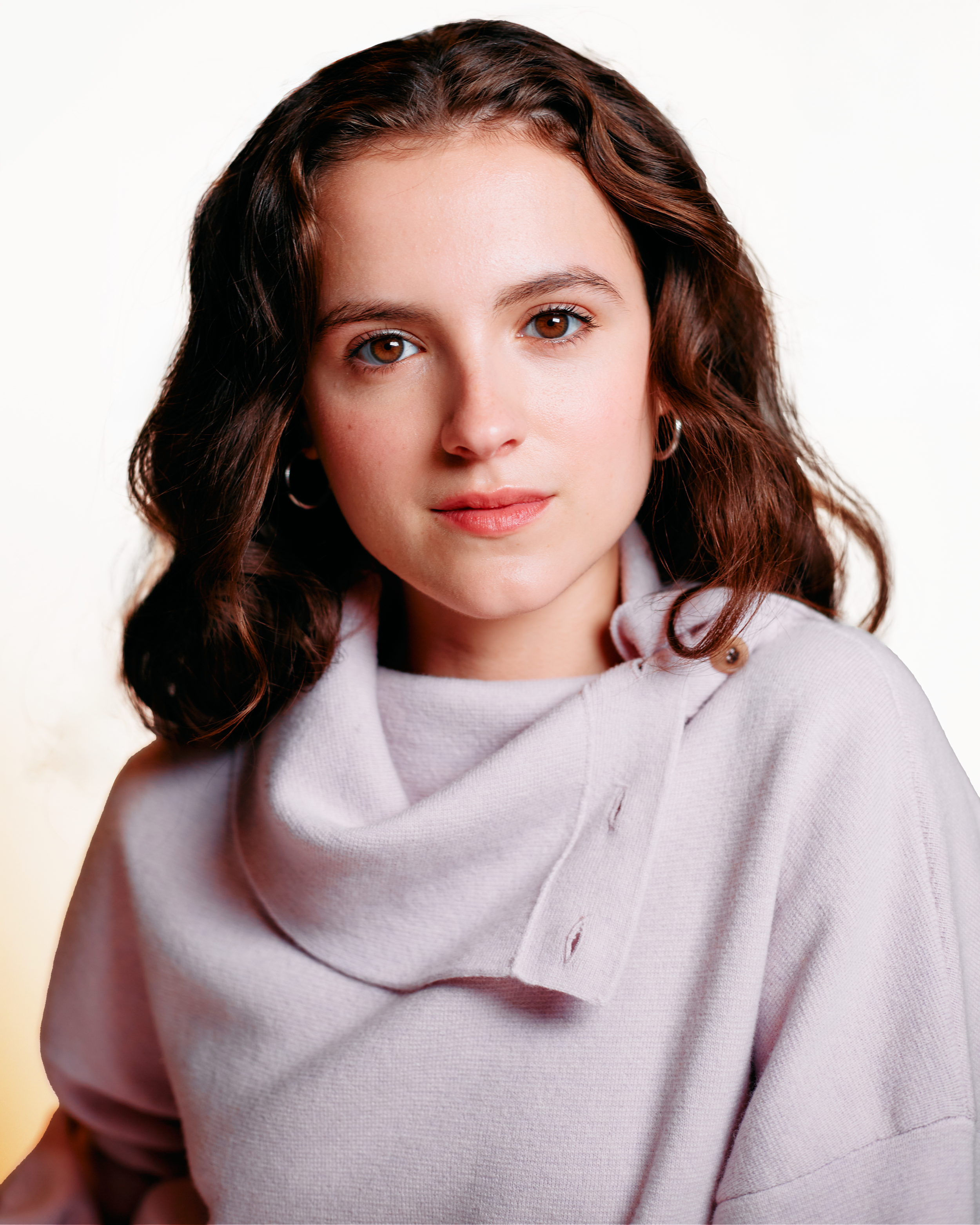Fina Strazza’s Growing Up, On Stage and Off

John Proctor is the Villain is teaching Fina Strazza that her work doesn’t just entertain—it matters.
Words by Dio Anthony, Photography by Dio Anthony, Styling by Joyce Onuorah , Styling Assistants Amanda Fazzio, Nate Abate, Hair by Corey Tuttle, Makeup by Amanda Thesen.
TThey say that what's meant for us won't pass us by. It’s an empowering idea—that the opportunities, relationships, and milestones meant to shape us are already written into the fabric of our lives. There’s no need for a tug-of-war. What’s ours will arrive, in its time, as if drawn by gravity.
I like to believe this idea. Despite being no closer to uncovering who originally said such a thing. What wise soul planted this idea that for many living people continues to hold such truth? The thing is, that while I may never come to know the name of this accidental philosopher, life itself has been proof of this certainty.
I think Fina Strazza's life has been proof of this too. 19-year-old Strazza stands before me a little over 5'5 feet tall. She's petite, with an inner wave of talent that towers over her. A New Yorker by birth, and a star by fate. At present, in her own words, she is "genuinely living" her dream. That dream has led her here. On stage, eight times a week in Kimberly Bellflower's John Proctor is the Villain, playing Beth Powell. Alongside Sadie Sink, Amalia Yoo, Morgan Scott, Maggie Kuntz, and a couple of other notable young actors--giving it their all every night at the Booth Theater. It is by all accounts, a dream--fully materialized, and totally real.
Rewinding the clock 11 years, a few steps away at the Shubert Theater, Strazza would make her Broadway debut. Becoming the youngest actress to portray Matilda at that time at just eight years old. Today as a teenage girl, she's a Tony Award nominee.
Just months before her 20th birthday and days ahead of her first Tony Awards ceremony as a guest of honor, she reflects on her early days on stage, her growth as a performer, and the power of the teenager.full look by MAJE
full look by MAJE
American Studies: I know you started your Broadway career as Matilda at eight years old, which you've spoken about in other interviews and is pretty remarkable. I'm really curious—at such a young age, what was that process like for you? Learning lines and stage blocking, being so young. Was that hard for you? Do you remember having to actually really draw focus, or was it a bit more effortless than that?
Fina Strazza: I was eight years old when I did Matilda, and I started acting when I was six. At the time that I started my audition process for Matilda, I was kind of in between my entrance for another Broadway show. I remember that once I started the audition process, I was just really excited to be there. I grew up knowing what Broadway was and being excited about theater. I was just really trying my best to prove myself and not make any issues for anybody.
And also, on Matilda, there were, I believe–14 kids in the show at a time. They managed to cast people who were kind of mini professionals. So it felt like a very professional environment, despite it being filled with children. I remember it being really, really fun–and it felt like we were all at the top of our craft at the time.
“ I grew up knowing what Broadway was and being excited about theater”
full look by MAJE
That's so cool. I always think it's interesting when young kids are nailing scenes with heavy dialogue and stuff like that. So, I wondered if it was a little hard for you to really draw that focus.
Right. Also, for a show like Matilda—the show is about two hours and 30 minutes long, and Matilda is on stage for about two hours and 15 minutes of it. And she's talking the entire time. So it required a lot of each of us. At that point, we’ve had like eight- or nine-year-long lives, you know? We hadn't lived very long. But that had been our lifelong dream at that point, for all of us. That made it a really good working environment.
Do you feel like your perspective on acting and storytelling has evolved since those days? Now that you’re much older, I'm assuming when you're playing a character, you're much more in tune with your emotions in a different way.
I think it does. I think when I was younger, I just had a lot more energy. I know I'm still really young, and I should still have a lot of energy now—but comparatively to a six-year-old, I have lost a little bit of steam. I think that when I was younger, I wasn't as aware of the impact the art was having on other people. I was aware of what I was doing, and I was aware of how it made me feel and how I felt when I was performing, but I don't think I ever really understood how meaningful it could be and how moved people could be from it. That's something that I think a lot more about, especially doing John Proctor now. Our audiences now are so vocal, and they laugh and they gasp and they cry the whole show– and we hear them. And then at the stage door afterwards, we're able to talk to them, and they tell us about their personal experiences. We come out every night to a huge group of women and it's a very rewarding thing to be able to see the impact that your work is having on other people.
I totally get that. You talked a little bit about your faithfulness to the stage door when we met–and how you never miss it. What's the hardest thing about doing the show on stage every night?
Somebody at the stage store just asked me this after the show last night. I think it's the physicality of the show and of this character. The way that I've decided to play Beth is–she holds her emotion in her body. And I don't think I anticipated how much I would be able to leave that at the theater or take that home with me. Because I've found that the show deals with some heavy themes and it can feel pretty dark at times. And I feel all that in my body. Even when I’m not thinking or feeling those things anymore. There's still an ache happening at times. I think that's a big part of doing this kind of show, and putting your physical self through that multiple times a week. It can take a toll on you emotionally and physically. Luckily I have a great cast and a great creative team, and our crew is amazing—so there’s a constant support system. So every time one of us feels like we’re falling, there'll be someone else to catch you.
That's so interesting and amazing. I like to think that with every good role, an actor learns something. Something that they carry with themselves off-stage. What has that been for you?
I just love how much the show allows teenagers to have these true problems and have these fully articulated thoughts. I think growing up is already so difficult. The way you feel as a teenager is so hard on its own.
When you're watching media about teenagers, it can make you feel so misunderstood—and kind of made fun of in a way. I think a lot of art doesn't allow teenagers to have these fully realized emotions and everything they say and do is heightened and made to be this hysterical thing. It's just been very interesting how many teenage girls at the stage door will say–-it was so wonderful that you guys were smart.
full look by SANDRO PARIS
That we seemed like such real teenagers, and that we were still smart. And that we were nice to one another and supportive of one another. You know, I am still a teenage girl, but I think I'm going to walk away with this with even more respect for teenage girls. A lot of what I see online and the shows and the plays that people make about that time of your life can be pretty degrading. You can start to feel bad about your place in the world as a teen and as an adolescent girl. But I think that I'm going to walk away being proud to be one right now.
full look by SANDRO PARIS
Respect for teenage Girls! Music plays such a powerful role in the show — it’s not just performance, it’s emotional release. You can feel how much it means to the characters, and honestly, to the cast too — everyone’s really living through it on stage. Is there a song — whether from your childhood or now — that’s moved you in a similar way? Something that’s spoken to you the way these songs speak to the girls in the show?
What I always think about during the show is the song Shut Up and Dance by Walk The Moon. That was a song from middle school and high school. I went to the same school from kindergarten until the12th grade, so my best friends had been my best friends for a really long time. I feel the same kind of upbringing with this song. I don't know what it was, but every time we heard it, we’d all find each other and squeal and just start dancing.
We would blast it at my house and I bought LED lights and a glowing disco ball just to have dance parties. That song would always be on our dance party list. We had a form of choreography to it too. There was always a certain way we’d dance to the song. It always makes me think about my friends. It doesn’t have the same emotional weight that Green Light now has to the girls in the show and to our audience–-but I think that was the song for me.
full look by SANDRO PARIS
full look by SANDRO PARIS
Who was the first person you remember obsessing over?
Harry Styles [laughs]. It was always Harry Styles.
How about a film TV show?
Pushing Daisies.
When people talk about John Proctor—or even a lot of the other projects you've been part of, whether it's film or TV—the phrase "coming of age" tends to come up, especially in stories centered around young people. What does that phrase mean to you?
I don't know, there's something kind of beautiful, but kind of heartbreaking always about coming of age. Because it involves this world shattering moment where you realize that your life is not what you thought it was and that the world is not what you thought it was.
But then there's this kind of hardened hope that happens at the end of it, where you're like, okay–I now see a few things a little bit more clearly and I'm going to find my place in that. There's always this kind of beautiful heartbreak involved.
full look by SANDRO PARIS
full look by SANDRO PARIS
“there’s something kind of beautiful, but kind of heartbreaking always about coming of age. ”
full look by RALPH LAUREN
Name this current chapter in your life?
[Laughs] Well, Neil Patrick Harris’ 2013 Tony opening is the best ever. I believe the song is called Bigger and I've been thinking about that a lot. So I'll say— Now We're Bigger. That’s one of the lines from the opening.
Amazing. Do you obsess over little things like that? Is that the type of theater fan you are?
Totally. [laughs] That's not a niche pick for anyone. I wish I had something more interesting to offer as my favorite, but yeah. Neil Patrick Harris' 2013 Tony opening is incredible.
ull look by RALPH LAUREN
Iconic. I love Neil and I love that. I love the idea that in John Proctor is the Villain, with The Crucible, since I read The Crucible in high school too—the girls are flipping the narrative and standing by this unpopular opinion, as unpopular as it might be to the people receiving it. What’s one unpopular opinion that you have?
There's a lot of foods I don't like. I don't like Kiwi. I know that Kiwi's not a super wildly loved food, but a lot of my friends seem to like it a lot and I don't. A better one is that I don't like tomatoes. Everyone likes tomatoes.
So, no pizza?
I can do it when it's a sauce or something, but I don't like an actual tomato on a sandwich or anything like that.
We spoke about your love for the stage door after the show. If you had to choose between the stage door or a pre-show ritual–which would you choose?
Oh gosh. Well I have a whole thing with my cast before the show–I can’t get rid of that.
I'll get rid of the stage door because, in Matilda I didn't get to do the stage door 'cause they didn't let the kids do it. We would exit from a different exit. So I have experienced not having done the stage door and it did make me sad, but I was ultimately okay. And I still think of Matilda fondly, so I guess I'll let go of the stage Door.
Is there something that you're currently romanticizing in your life at the moment?
I feel like I kind of don't have to right now, you know? I’m genuinely living my dream.
So many people are walking away inspired by this broadway show. What is inspiring you right now?
You know, I wish I was able to watch more art recently. I just watched two Reese Witherspoon movies the other night–she was very young in them. Man in the Moon and Wildflower. They're both set in the 1930s to the fifties in the south. They’re these coming of age stories and she’s about 14 years old. I thought I’d like to do something like that–a story set in that time period. I’ve got the southern aspect down, and the coming of age too–now lets just move it back a few years. There’s something really interesting to me about those time periods. I want to do something retro like that. Watching these films gets me excited.
As a New Yorker, as someone who has spent a substantial amount of time in the city–what’s your favorite thing about New York?
I read this essay by Colson Whitehead called The Colossus of New York. It's the prologue—it’s called City Limits. There’s a line where he says, “You become a New Yorker when what was there before is more real than what’s there now.” It’s like, you walk around the city, passing places and thinking, Ugh, that used to be my favorite coffee shop, and now it’s this shoe store, and you’re upset about it.
You’re walking past where the bodega used to be, or the café, and there’s just something about it. You know, these memories always live on in the city—and if you’ve grown up here, particularly, you can’t walk anywhere without thinking, That’s where I did this, that’s where I did that, that’s where that used to be. I just love how it’s this breathing artifact that’s always changing, always alive. And I just love New York.I could talk about if forever.
I feel the same way.

